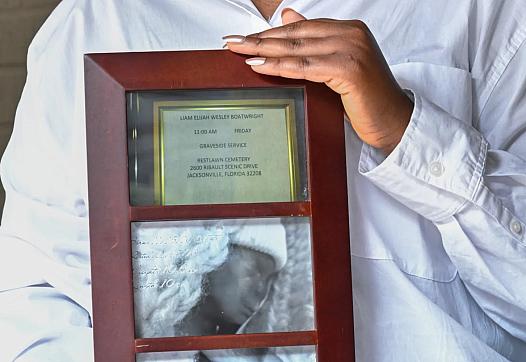Are midwives and doulas the answer to keeping more Black babies alive?
The story was originally published by the South Florida Sun Sentinel with support from our 2023 Data Fellowship.
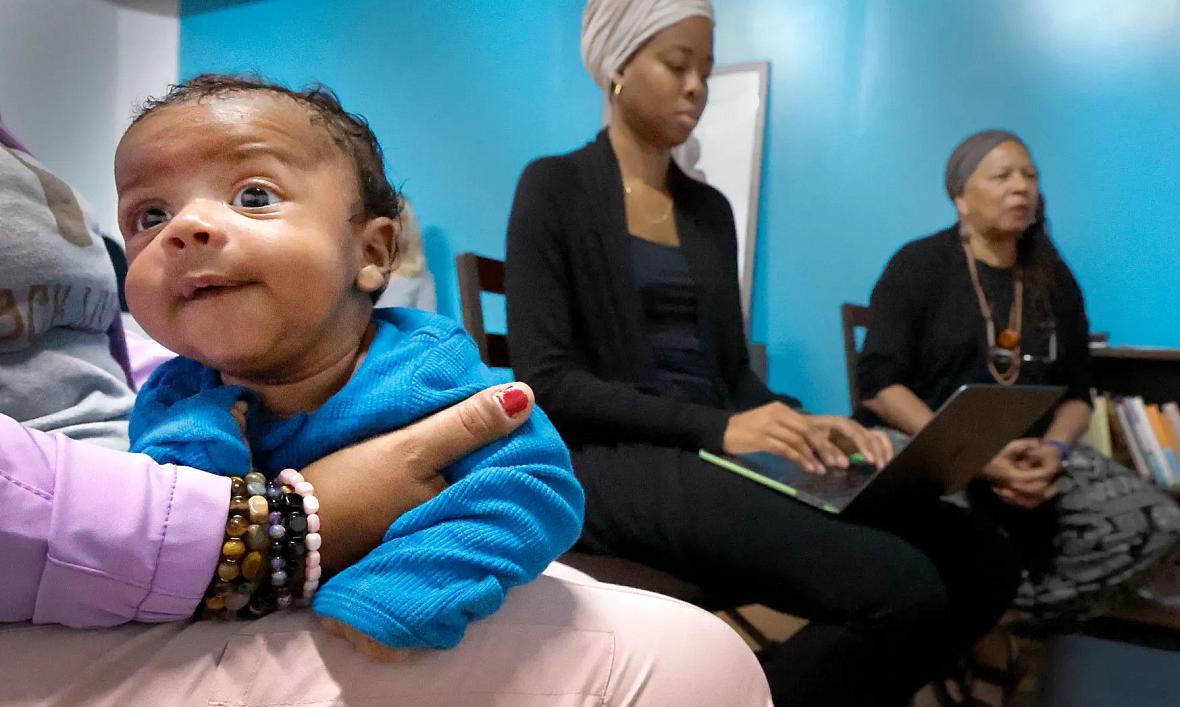
Midwife Jamarah Amani holds on to 2-month-old Travis Small Jr. during his mother’s post-natal visit at the Southern Birth Justice Network in Miami.
(Carline Jean/South Florida Sun Sentinel)
This is part of a series of South Florida Sun Sentinel articles exploring maternal health care.
It is 2 a.m. when Brianca Spence slips behind the wheel of her car. The drive to the nearest hospital can stretch as long as an hour, and feel like an eternity when she’s rushing to guide an expecting mother through childbirth.
As labor unfolds, Spence will translate the harsh demands of a nurse on duty into calming guidance. She will encourage the woman to ask for pain medication when she needs it or suggest a position change to speed up labor. And, when the mother eventually returns home with a new baby, Spence will be her pillar of support, encouraging her to stick with breastfeeding, or go for her postpartum doctor’s visit.
In this maternity care desert on the western fringes of Palm Beach County, Spence’s mission as a doula is to advocate for mother and baby before, during and after childbirth. If she does her job well, she will play a vital role in keeping more Black mothers and babies alive.
With Florida’s infant mortality rate stubbornly higher than the national average and Black babies in the state dying at more than double the rate of white non-Hispanic babies, doulas represent a potential pathway to address the problem.
Doula training has ramped up in the state, the result of a confluence of factors that are making the option more available to women — particularly women of color — who may benefit most from having an advocate through the process. Doulas are non-medical, trained labor assistants or coaches who provide physical and emotional support during pregnancy, childbirth and recovery. A doula will speak up for a mother when a doctor dismisses her concerns. She will ensure a woman’s birth plan is followed as much as possible. And, she will pick up on signs of complications or postpartum depression that could have been overlooked.
There’s no legal training requirement for doulas in Florida, although most have completed certification programs.
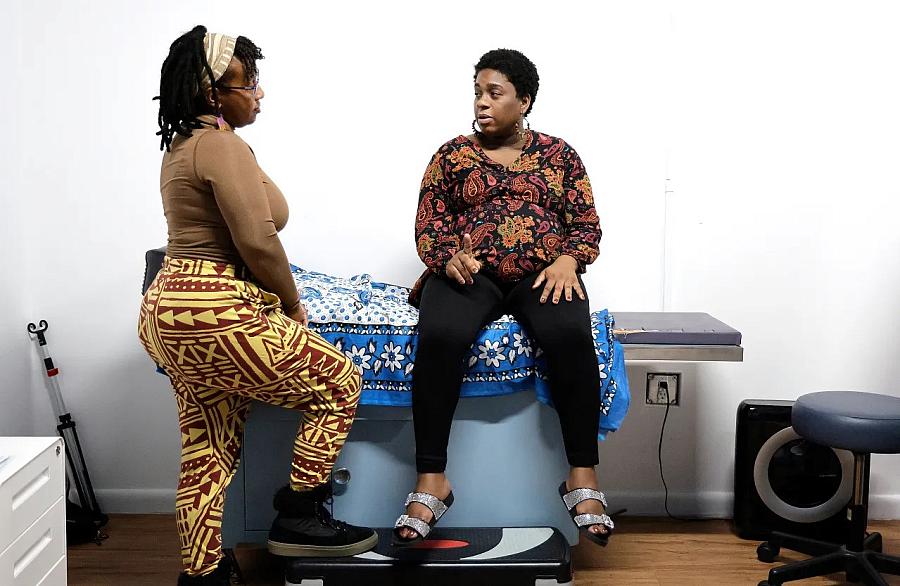
Midwife Jamarah Amani, left, talks to Rebekah Antoine, 33, of North Miami Beach during a prenatal visit in February at the Southern Birth Justice Network in Miami. Antoine, who was pregnant with her fourth child, has since given birth to a healthy baby boy.
(Carline Jean/South Florida Sun Sentinel)
To become a doula, Spence participated in the first cohort in 2022 to graduate from a training program through Healthy Mothers, Healthy Babies Palm Beach County. The program was specifically designed to drive down death rates for Black mothers and babies. Spence then joined Florida’s Doula Network, an Orlando-headquartered company that provides health plans with credentialed doulas. In Florida, The Doula Network contracts with Medicaid plans to cover doula services and typically pays the doulas a flat fee for prenatal, childbirth and postpartum support. “Each plan has a different amount that they pay,” Spence said. A private-pay client typically pays a doula a higher rate, she said.
Spence balances her doula role with a full time job at Lake Okeechobee Rural Health Network and her responsibilities as a mother of three young children. She gave birth to her children in a birthing center using a midwife and wants other mothers to have a good birth experience, too.
“I just want to be that support for women in my community,” she said. “The most important thing I do is teach them to speak up and what to speak up for. You don’t get that with a traditional prenatal provider.”
In the past, doula care often has been unaffordable to low-income Black women who have higher risk of birth-related complications. If self-paid, a birth doula can cost $1,200 to $4,000, depending on whether pre- and post-birth visits are included.
As of 2019, many Medicaid enrollees in Florida’s managed care plans have access to the doula benefit. Florida is one of only 13 states that allows Medicaid plans to cover doula services, as an optional benefit. Some Florida plans offer it only to high-risk mothers while others make it more widely available.
For national insurer Elevance Health, Florida is one of the biggest markets for doula services in its Medicaid plans.
“We recognize that the Black community is really embracing doulas as an opportunity for change, and so we’re trying to put ourselves in that space to be able to help support that,” said Dr. Tiffany Inglis, national medical director at Elevance Health.
Inglis said her company began its foray into doula coverage by educating doctors, nurses and midwives in its network on the value they bring to the care team.
“We made it clear we don’t want doulas to replace doctors, nurses and midwives. We want them to be part of the care team so that we can sort of remove that burden to find social support (for a mother) from a clinical team that’s not trained for it,” Inglis said.
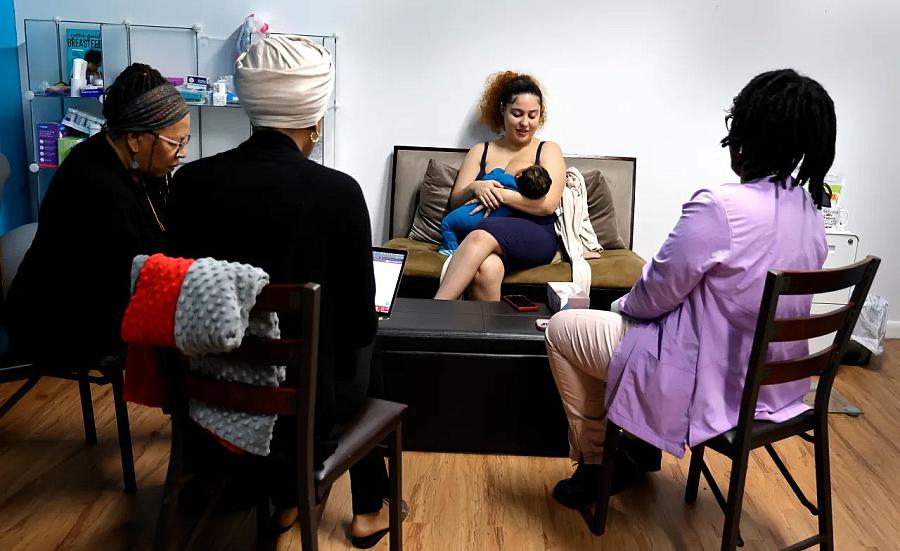
Ashly Hinds, 30, of Coconut Grove, is surrounded by midwives as she breastfeeds her 2-month-old son, Travis Small Jr., during a post-care visit at the Southern Birth Justice Network in Miami.
(Carline Jean/South Florida Sun Sentinel)
Spence, for example, not only accompanies mothers to prenatal and postpartum visits, but she also connects them to community resources for food, diapers, transportation, or mental health counseling.
Inglis said Elevance looks to its doctors to promote doula usage among patients and tracking results. “The plans are putting doulas in communities where they know we have larger populations of Black moms because we are seeing such a good impact from it and we are seeing such a good uptake of it,” Inglis said.
Rebekah Antoine, a doula and community programs director with Miami’s Southern Birth Justice Network, said the doula benefit through Medicaid is a public health intervention and has the potential to reduce not only Florida’s infant mortality rate but also its maternal mortality and morbidity rates.
She wants to see Florida take the next step.
“There needs to be more funding going to community-based organizations to train new doulas to serve within their communities.” Antoine said. “There needs to be more education to let Medicaid recipients know the benefit is available. Midwives and doulas should be an option suggested to a pregnant person when they enroll.”
Just because you have a benefit doesn’t mean that you know how to sign up and how it works. Connecting the patients to the doulas is a missing link, she said.
Antoine would like to see state health officials foster more partnerships between doulas and providers such as Federally Qualified Health Clinics located in communities of color, particularly the underserved Haitian community.
“Doulas and midwives are an important part of the collaboration for making quality maternal care more accessible,” she said.
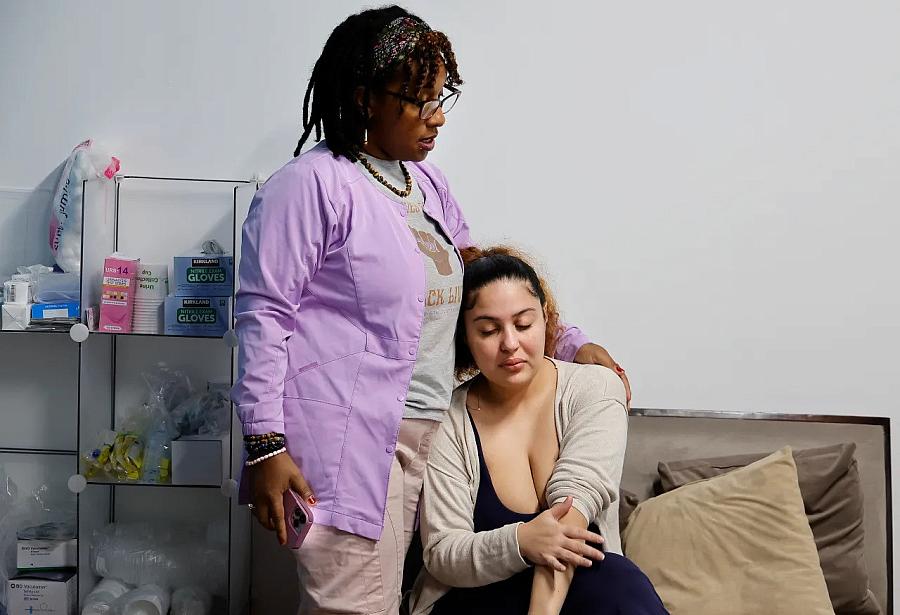
Midwife Jamarah Amani, left, comforts Ashly Hinds, 30, of Coconut Grove during a post-birth care visit at the Southern Birth Justice Network in Miami.
(Carline Jean/South Florida Sun Sentinel)
In Tallahassee, the services that doulas provide to the minority communities have caught the attention of Florida Sen. Rosalind Osgood, D-Tamarac.
Osgood wants to propose doula legislation similar to a law recently passed in Virginia, which mandates that health insurers who cover obstetrical services also provide coverage for state-certified doulas. She wants plans to set a higher rate for reimbursement. Doulas often complain of low reimbursement rates.
“I would like to see doulas paid consistently by healthcare providers for their advocacy and support of babies and mothers doing childbearing,” Osgood said. “Once we get some kind of criteria for certification, it makes it easier to allocate government dollars for those services and ensure doulas get paid fairly for their services.”
The state of Florida now connects pregnant women with doulas as a new initiative of the Florida Association of Healthy Start Coalitions.
Medicaid plans have provided funding to Healthy Start to train doulas. Sixteen of the 32 Healthy Start offices in Florida are working to complete the certification of the trained doulas and connect them with pregnant women.
Healthy Start’s Cathy Timuta asked the state in its 2024 session for more money to expand the Florida Healthy Start doula program to improve the disparities in birth outcomes for women of color.
“Healthy Start is launching a doula program through contracts with some of the health plans for the Medicaid population. However, we are in need of funding for the pregnant mothers who are not eligible for Medicaid which represent about 50% of births in Florida,” she wrote in a funding request for 2024-25.
So far, the state has not approved the funding request.
However, in Miami, a Black Maternal and Infant Health Equity Collaborative has formed to train and certify 65 doulas and incorporate them into the obstetric care teams at Jackson Health, Miami-Dade’s large public hospital system.
“We have trained 29 doulas so far as well as training hospital staff to create a more doula-friendly environment,” said Loreen Chant, executive director of the Health Foundation of South Florida, which has provided funding for the Jackson Doula Pilot Project.
But doulas aren’t medical providers and won’t solve the problem of dwindling maternal care in some neighborhoods. About 19% of Florida’s counties are maternal care deserts, particularly concerning for Black women who face death rates related to pregnancy that are over three times those for white women.
Midwives are stepping in to fill the gaps and provide what they call “more culturally sensitive care.”

Tatum Tervola relaxes during the sound healing session at the Community Birth Wellness Festival & Midwife360 Family Reunion in early April at Dreher Park in West Palm Beach. The event brought together families, midwives, doulas, and healthcare providers to celebrate family wellness with workshops and demonstrations on natural childbirth, breastfeeding, and postpartum care.
(Scott Luxor/Contributor)
In a small office building in North Miami, Jamarah Amani runs a midwife clinic through a nonprofit called Southern Birth Justice Network. The space is calming, as is Amani’s voice as she sees Ashly Hinds for her first visit after giving birth. She asks the new mother about her success with breastfeeding, her mental health, her sex life.
Amani explains that midwives play a vital role in obstetric care.
“There’s different reasons that people come to us,” Amani said. “Sometimes it’s because they don’t trust the hospital. Sometimes it is because of previous birth trauma, or maybe they’re undocumented and they don’t want to be caught up in the system. But they do know when they come, that they’re going to get a more individualized, holistic, family-centered approach.”
Hinds, 30, of Coconut Grove said she is aware of the disparities facing mothers of color and didn’t feel comfortable with a hospital birth. She sought Amani to deliver her baby in her home. “For me it’s cultural,” Hinds said. “My grandmother was born at home with a midwife. What’s my normal might not be everyone else’s, and that’s OK.”
The U.S. Centers for Disease Control and Prevention has found Black women are three times more likely to die from a pregnancy-related cause than white women. Midwives like Amani see more interest in her profession with greater attention to these statistics.
A recent analysis highlighted by The Commonwealth Fund found that a midwife workforce, integrated into health care delivery systems, could potentially avert as much as 39% of neonatal deaths and 26% of stillbirths.
In Florida, midwives need a license to practice but they typically don’t see high-risk patients.
Community midwives work outside of hospitals, delivering babies in birthing centers or at homes. Some Florida hospitals like Jackson Health in Miami or UF Health in North Florida offer team-based care that includes nurse midwives as part of their staff.
Florida’s new Live Healthy bill championed by Kathleen Passidomo eases the restrictions on independent midwives, making it easier for them to practice at birthing centers. The bill also allows “advanced birth centers” to provide cesarean section deliveries for women considered low-risk pregnancies. Until now, birth centers have been prohibited from providing cesarean sections, surgical procedures previously done only in hospitals.
Some insurers including Medicaid cover the cost of midwives, but reimbursement rates vary, and often are low. Typical midwives spend at least 45 minutes with a patient each visit, a different approach than most obstetricians..
“Many traditional providers will spend very little time with their patients because they just need the volume,” Amani said.
Florida has 853 certified nurse midwives, according to the national certification board, and 169 student midwives.
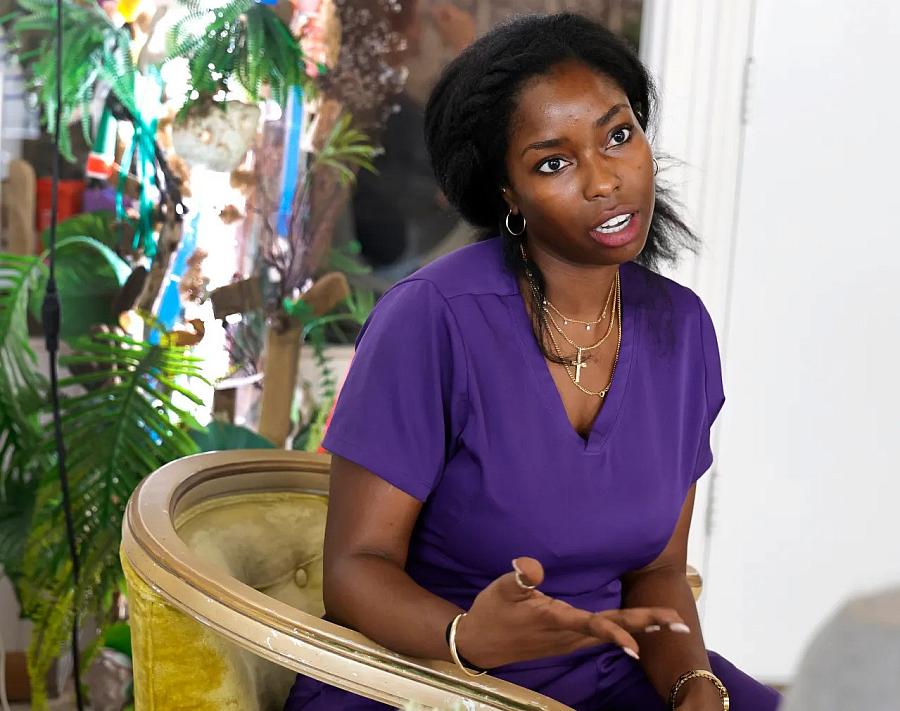
Johanne Ulysse, 31, who is in training to be a midwife, talks about her experience with giving birth to her son. Ulysse is doing her internship at the Southern Birth Justice Network in Miami. Ulysse said when her baby went into distress at 41 weeks, she had an emergency C-section. “I thought, there has to be a better way.”
(Carline Jean/South Florida Sun Sentinel)
One of those student midwives is 32-year-old Johanne Ulysse. The Coral Springs mom is studying to become a midwife after a bad birth experience. Ulysse said when her baby went into distress at 41 weeks, she had an emergency C-section. “I thought, there has to be a better way.” The baby survived, but Ulysee knows the statistics — about 1,300 babies a year in Florida do not survive their first year.
“Midwives will talk about the patient’s personal life, health, diet … a lot of things that culminate and make a healthy pregnant person,” Ulysse said. “I think that if more Black women knew you don’t have to go to a doctor. You can have a midwife who will listen to you and give you more in-depth care. I think that it would be revolutionary.”
Jennie Joseph, founder of Orlando’s Commonsense Childbirth, became the first Black person in the U.S. in 2020 to privately own a nationally accredited midwifery school. She says Florida should offer universal healthcare to cover all women who want access to midwifery care, or doula care, or other maternal health providers.
As opposed to an OB-GYN she will take anyone who needs maternal care, regardless of their insurance status, and help them through the difficult process of applying to Medicaid, which few physicians in Florida want to accept, she said.
“Once you get to our clinic or make a phone call to our clinic, the answer is always going to be ‘Yes, we will see you.’”
After years of feeling dismissed in hospitals or provider offices, many Florida women are working to find prenatal caregivers who look like them, speak their language and listen to their concerns.
Belle Glade, a town with a significant population of women who are Hispanic, Black and Haitian, has only two prenatal care providers, and the nearest hospital with labor and delivery is 30 to 45 minutes away.
In her doula role, Spence feels like she is the safety net in her diverse community.
“When I looked at the stats and numbers and the community here, I saw mothers and babies in rural areas are dying more and the people who could make a difference don’t know or understand why,” Spence said. “Doulas might not be the end-all-be-all, but it’s a step in the right direction.”
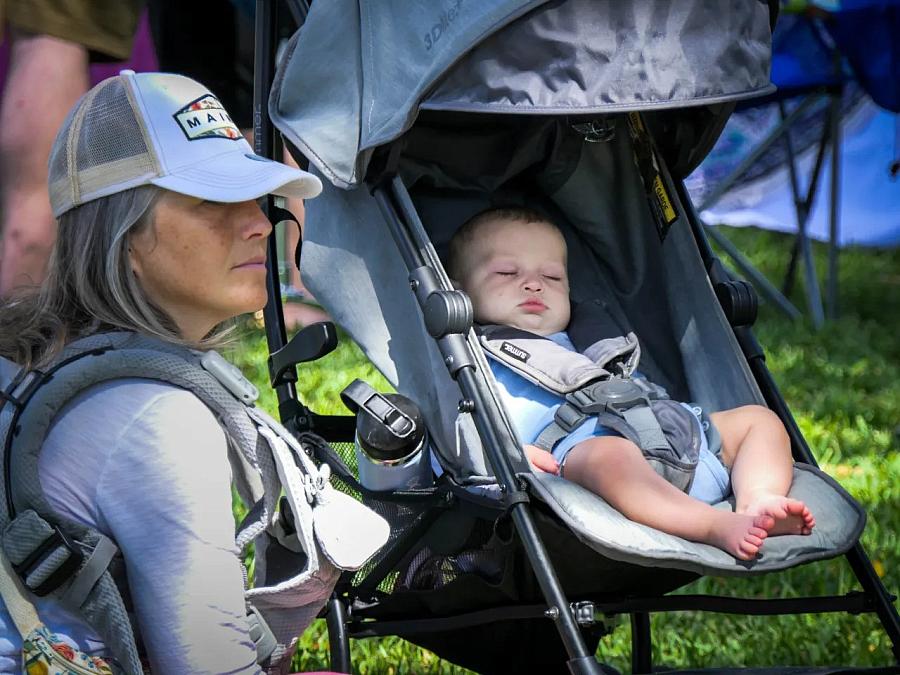
Monica James’ baby fell asleep during the sound healing ceremony at the Community Birth Wellness Festival & Midwife360 Family Reunion in April at Dreher Park in West Palm Beach. The event brought together families, midwives, doulas, and healthcare providers to celebrate family wellness with workshops and demonstrations on natural childbirth, breastfeeding, and postpartum care.
(Scott Luxor/Contributor)


